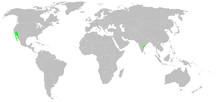Homalonychus
Homalonychus is a genus of araneomorph spiders, and is the only genus in the family Homalonychidae. It was first described by George Marx in 1891.[2] As of May 2019 it contains only three species: H. raghavai, H. selenopoides, and H. theologus.[1] Two are found in the southern United States and Mexico: H. theologus is mostly found west of the Colorado River, while H. selenopoides is mostly found to the east, with some populations in Death Valley and near Mercury, Nevada.[3]
| Homalonychus | |
|---|---|
.jpg) | |
| Scientific classification | |
| Kingdom: | Animalia |
| Phylum: | Arthropoda |
| Subphylum: | Chelicerata |
| Class: | Arachnida |
| Order: | Araneae |
| Infraorder: | Araneomorphae |
| Family: | Homalonychidae |
| Genus: | Homalonychus Marx, 1891[1] |
| Type species | |
| H. selenopoides Marx, 1891 | |
| Species | |
| |
 | |
They do not build webs, and are typically found under rocks or dead vegetation. At least the two North American species live in deserts, to which they are adapted by color and specialized setae which allow them to attach sand and fine soil to themselves. They also partially bury themselves.[4]
In 1991 a single female was described in India,[5] but it is likely misplaced in this genus.[1]
References
- Gloor, Daniel; Nentwig, Wolfgang; Blick, Theo; Kropf, Christian (2019). "Gen. Homalonychus Marx, 1891". World Spider Catalog Version 20.0. Natural History Museum Bern. doi:10.24436/2. Retrieved 2019-06-11.
- Marx, G. (1891). "A contribution to the knowledge of North American spiders". Proceedings of the Entomological Society of Washington. 2: 28–37.
- "Genus Homalonychus". BugGuide. Retrieved 2019-06-11.
- Crews, Sarah C. (2006-09-10). "Homalonychus in the Desert Southwest". University of California, Berkeley. Archived from the original on 2006-09-10. Retrieved 2019-06-11.
- Patel, B. H.; Reddy, T. S. (1991). "A rare new species of Homalonychus Marx (Araneae: Homalonychidae) from coastal Andhra Pradesh, India". Records of the Zoological Survey of India. 89: 205.
Further reading
- Chamberlin, R.V. (1924). "The spider fauna of the shores and islands of the Gulf of California". Proc. Calif. Acad. Sci. 12: 561–694.
- Crews, Sarah C.; Hedin, M. C. (2006). "Studies of morphological and molecular phylogenetic divergence inspiders (Araneae: Homalonychus) from the American southwest including divergence along the Baja Peninsula" (PDF). Molecular Phylogenetics and Evolution. 38 (2): 470–487. doi:10.1016/j.ympev.2005.11.010. PMID 16376109. Archived from the original (PDF) on 2006-09-15.
- Roth, V. D. (1984). "The spider family Homalonychidae (Arachnida, Araneae)" (PDF). American Museum Novitates. 2790.
- Vetter, R. S.; Cokendolpher, J. C. (2000). "Homalonychus theologus (Araneae, Homalonychidae): Description of eggsacs and a possible defensive posture" (PDF). The Journal of Arachnology. 28 (3): 361–363. doi:10.1636/0161-8202(2000)028[0361:HTAHDO]2.0.CO;2.
External links


- Pictures of Homalonychus sp.